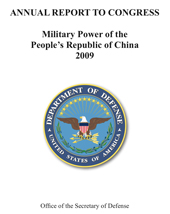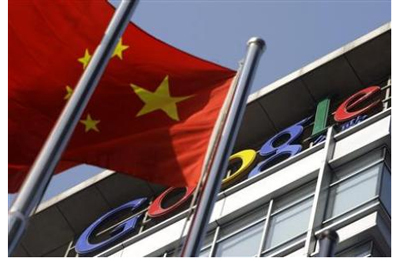Our colleague and regular contributor D. K. Matai starts a series on cyber security issues which complements John Wheeler’s contributions to SLDinfo on the same subject. John Wheeler is shaping proposed Title X language for constructing a legal framework for the engagement of U.S. forces in dealing with the cyber domain as it does with the ground, land, air and space domains.
***
China’s Cold Cyberwar: Rise of 5th-Dimension Red Army and Economic Pearl Harbor?
China’s digital attacks: a turning point in cyberwarfare
The recent China-based cyber attacks on more than thirty Silicon Valley companies, including Google, are the beginning of a new stage in the evolution of cyber warfare. The attacks targeted and stole source code and user information from the companies’ servers. Based on the sophistication and scope of the attacks, security experts have concluded that state-sponsored actors were likely involved. Despite all the handshakes, we are in the midst of a Cold Cyberwar.
Cyber Warfare
The China digital attacks represent a turning point in cyber conflict for the following reasons.
- First, these are the largest and most sophisticated cyberattacks to have targeted specific corporations in many years.
- Second, the attacks had the most visible goals of controlling information flows in and out of China.
- Third, the attackers wanted to acquire core intellectual property and digital identities of foreign competitors.
As a result of the incidents, Google claims it will no longer censor its search results in China and it may withdraw from the country altogether.
Economic Pearl Harbor?
A hither-to unknown security hole in Microsoft’s Internet Explorer (IE) was exploited during the attacks. Recognized in mid-January, Microsoft is working on a patch. It has warned that versions 6, 7, and 8 of the web-browser are affected by the vulnerability.
In response, the German and French governments have advised their agencies to stop using IE. They have further warned their citizens of their continuing vulnerability when using Microsoft’s web browser.
Hidden deeper in Berlin and Paris is the growing awareness that Beijing has been able to acquire critical parts of source code of IE and much of the underlying platform and proprietary software.

Designing a Counter-Cyberattack Strategy
China’s Cyber Army
For the first time in 2007, a U.S. military report into the future of geo-political relations with China suggested that the Chinese government was developing a cyber warfare division for use in possible future conflicts.
The report, entitled “The Military Power of the People’s Republic of China,” suggested that, in addition to the People’s Liberation Army’s (PLA) ground force, navy, air force, and rocket arms, the Chinese government was putting together a team to deal with “electronic and online arenas.”
“People’s Liberation Army authors often cite the need in modern warfare to control information, sometimes termed an ‘information blockade,’” the report says. “China is pursuing this ability by improving information and operational security, developing electronic warfare and information warfare capabilities, denial-of-service and deception… China’s concept of an ‘information blockade’ likely extends beyond the strictly military realm to include other elements of state power.”
The same U.S. defense report suggested that China is developing teams to attack, defend, and exploit computer networks with a separate section handling electronic countermeasures. It cited logistics systems and satellite communications as possible targets and claims that exercises have been held in cooperation with other PLA wings since 2005.
Indeed, the cyber warfare programs of China and the U.S. share one objective: to access and render inoperable the command and control systems of adversaries, whether earth- or space-based.
But the potential of cyber warfare goes far beyond infiltration into the communications systems of a potential adversary. Looking back to the height of the Cold War, nuclear missile technology and weaponry were focused on physical destruction of the infrastructure of adversaries. Psychological deterrence was one objective. The other was to decimate potential adversaries’ economies should war become unavoidable.
Increasingly, the advanced economies of the world have become dependent on the worldwide web for managing banking, finance, telecommunications, energy flows, power grids, transportation and delivery systems, industrial processes, inventory management, emergency services, remote diagnostic medical assistance, etc.
Solutions for The Cyber Warfare Paradigm Shift
The Pandora’s box of full-scale cyber war is open now. As in all wars, our collective national defenses must excel enemy aggression. We will therefore need to understand the following.
- First, defense has always been about securing trade routes and markets. Considering several trillion dollars of trade is routed digitally, a counter-attack will require electronic weapons that can disable attacking systems from various parts of the world. This counter-attack will ultimately need the support of governments. These forces will save businesses a lot of lost time and money in dealing with rogue, politically motivated, electronic attacks from radical and criminal groups scattered across the world and within nation(s).
- Second, mobilization of resources including new investment will become necessary on interoperable, knowledge management and analysis systems.
- Third, investment in more local human intelligence across the globe will be essential. The expertise of the very few available people who are proficient in digital technologies would need to be utilized to train the counter-attack-forces through the establishment of national centre(s) of excellence for digital defense.
- Fourth, nothing significant can be achieved without this cohesive sharing capability being made available to the future counter-attack-forces, who would be able to ensure reliability, availability, maintainability, and scalability of business systems in the event of protracted hacker attacks.
We must ultimately hope that the pace of dissemination of real time information throughout the world will outpace the determination of a few governments and their proxies to disrupt our way of life.
———–
***Posted February 13th, 2010


